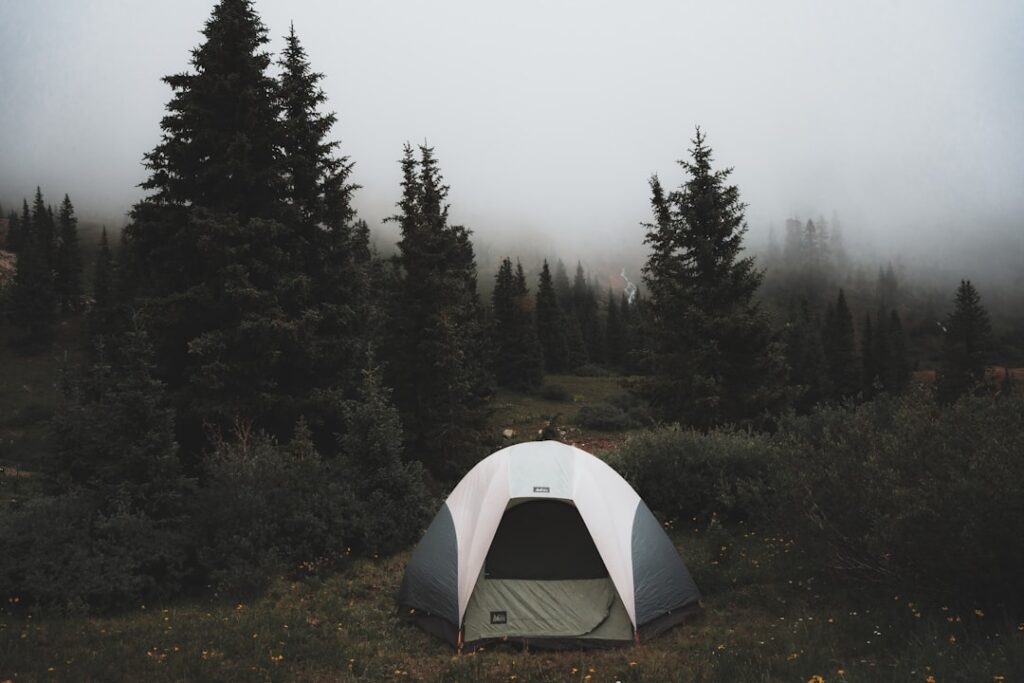Minimalist camping is a philosophy that encourages individuals to strip down their camping experience to the essentials, focusing on simplicity and efficiency. This approach emphasizes the idea that one does not need a plethora of gear or extravagant setups to enjoy the great outdoors. Instead, minimalist camping advocates for a more profound connection with nature, allowing campers to immerse themselves in their surroundings without the distractions of modern conveniences.
By prioritizing what is truly necessary, minimalist campers can experience a sense of freedom and clarity that often eludes those who are burdened by excessive equipment and complicated arrangements. At its core, minimalist camping is about embracing a lifestyle that values experiences over possessions. Campers who adopt this mindset often find joy in the simplicity of their surroundings, learning to appreciate the beauty of nature without the interference of technology or material goods.
This approach not only enhances the camping experience but also fosters a deeper understanding of one’s own needs and desires. By reducing the clutter in their camping gear and focusing on what truly matters, minimalist campers can cultivate a more meaningful relationship with the environment.
Key Takeaways
- Minimalist camping is about simplifying your camping experience by carrying only the essential gear and focusing on the experience of being in nature.
- The benefits of minimalist camping include a lighter pack, less environmental impact, and a deeper connection with nature.
- Essential gear for minimalist camping includes a lightweight tent, sleeping bag, portable stove, and multi-purpose tools.
- Choosing the right location for minimalist camping involves considering factors such as accessibility, natural beauty, and environmental impact.
- Food and cooking tips for minimalist camping include packing lightweight, non-perishable foods and using multi-functional cooking tools.
The Benefits of Minimalist Camping
Reduced Stress and Increased Enjoyment
One of the most significant advantages is the reduction of stress associated with planning and setting up a camping trip. With fewer items to manage, campers can spend less time worrying about logistics and more time enjoying their surroundings.
A More Spontaneous and Flexible Experience
This simplicity allows for a more spontaneous and flexible camping experience, where individuals can adapt their plans based on weather conditions or personal preferences without being tied down by excessive gear.
A Deeper Connection with Nature and Improved Well-being
Moreover, minimalist camping promotes a deeper connection with nature. By eliminating distractions, campers can fully engage with their environment, whether it’s listening to the rustle of leaves in the wind or observing wildlife in its natural habitat. This immersion fosters mindfulness and encourages individuals to appreciate the small details that often go unnoticed in everyday life. As a result, many find that minimalist camping not only rejuvenates their spirit but also enhances their overall well-being.
Essential Gear for Minimalist Camping

When it comes to minimalist camping, selecting the right gear is crucial. The focus should be on lightweight, multifunctional items that serve multiple purposes while taking up minimal space. A high-quality tent that is easy to set up and pack away is essential, as it provides shelter without adding unnecessary weight.
Additionally, a compact sleeping bag and sleeping pad are vital for ensuring a comfortable night’s sleep while remaining portable. Cooking gear should also be streamlined; a simple camp stove or portable grill, along with a few essential cooking utensils, can suffice for most meals. Opting for dehydrated or pre-packaged meals can further reduce the need for extensive cooking equipment.
Furthermore, a reliable water filtration system is indispensable for staying hydrated without carrying large amounts of water. By carefully curating their gear, minimalist campers can ensure they have everything they need without being weighed down by excess.
Choosing the Right Location for Minimalist Camping
| Location | Distance from Civilization | Access to Water | Shelter Availability |
|---|---|---|---|
| Mountain | Far from civilization | May have natural springs | Rock formations can provide shelter |
| Forest | Varies, can be remote | Rivers and streams | Abundant trees for shelter |
| Desert | Remote locations | Limited water sources | Caves or rock overhangs for shelter |
Selecting an appropriate location is a fundamental aspect of minimalist camping. Ideal sites are often those that offer natural beauty and tranquility while being accessible without extensive travel. National parks, state forests, and remote wilderness areas are excellent choices for those seeking solitude and a genuine connection with nature.
These locations typically provide ample opportunities for exploration and adventure while allowing campers to escape the noise of urban life. Additionally, it’s essential to consider the amenities available at potential camping sites. While minimalist camping emphasizes simplicity, having access to basic facilities such as restrooms or water sources can enhance the experience without compromising the minimalist ethos.
Researching various locations ahead of time can help campers find spots that align with their values and preferences, ensuring a fulfilling outdoor experience.
Food and Cooking Tips for Minimalist Camping
Food preparation during minimalist camping requires creativity and planning. Since space and weight are limited, campers should focus on meals that are easy to prepare and require minimal ingredients. One-pot meals are an excellent option, as they allow for quick cooking and easy cleanup.
Ingredients like rice, beans, and dehydrated vegetables can be combined to create nutritious dishes without the need for extensive cooking gear. Snacks also play a vital role in maintaining energy levels during outdoor adventures. Lightweight options such as trail mix, energy bars, or dried fruit can provide sustenance without taking up much space in a backpack.
Additionally, planning meals ahead of time can help minimize food waste and ensure that all ingredients are used efficiently. By adopting these strategies, minimalist campers can enjoy satisfying meals while adhering to their commitment to simplicity.
Embracing Sustainability in Minimalist Camping

Sustainability is an integral part of the minimalist camping philosophy. By reducing gear and waste, campers can minimize their environmental impact while enjoying nature. This approach encourages individuals to leave no trace by following principles such as packing out all trash and minimizing campfire use to prevent damage to natural habitats.
Emphasizing sustainable practices not only protects the environment but also enhances the overall camping experience by fostering a sense of responsibility toward nature. Moreover, choosing eco-friendly products can further support sustainability efforts during camping trips. Biodegradable soaps, reusable utensils, and solar-powered lights are just a few examples of items that align with environmentally conscious camping practices.
By making mindful choices about gear and supplies, minimalist campers can contribute positively to the preservation of natural spaces while enjoying their adventures.
Safety Considerations for Minimalist Camping
While embracing minimalism in camping can enhance the experience, safety should always remain a top priority. Campers must be prepared for various situations by carrying essential safety gear, even if it means sacrificing some space in their packs. A first aid kit is crucial for addressing minor injuries or emergencies that may arise during outdoor activities.
Additionally, having a reliable navigation tool—such as a map and compass or GPS device—can help prevent getting lost in unfamiliar terrain. Understanding weather conditions is another vital aspect of safety in minimalist camping. Campers should check forecasts before heading out and be prepared for sudden changes in weather by packing appropriate clothing layers.
Knowledge of local wildlife and potential hazards is also essential; being aware of how to handle encounters with animals or navigate challenging terrain can significantly enhance safety during outdoor adventures.
Connecting with Nature during Minimalist Camping
One of the most rewarding aspects of minimalist camping is the opportunity to connect deeply with nature. Without the distractions of modern life, campers can fully immerse themselves in their surroundings, fostering a sense of peace and tranquility. Activities such as hiking, birdwatching, or simply sitting quietly by a campfire allow individuals to engage with the environment on a more profound level.
This connection often leads to moments of reflection and gratitude for the beauty of the natural world. Furthermore, minimalist camping encourages mindfulness practices that enhance this connection with nature. Taking time to observe the details—the colors of leaves, the sounds of flowing water—can cultivate appreciation for the environment’s intricacies.
Many find that these moments spent in nature not only provide relaxation but also inspire creativity and clarity in other areas of life.
Minimalist Camping with Kids
Introducing children to minimalist camping can be an enriching experience for families seeking adventure together. Teaching kids about simplicity and resourcefulness fosters valuable life skills while allowing them to appreciate nature from an early age. Involving children in the planning process can also make them feel more invested in the experience; they can help choose locations or select gear that excites them.
When camping with kids, it’s essential to strike a balance between minimalism and comfort. While packing light is important, ensuring that children have adequate sleeping arrangements and engaging activities is crucial for keeping them happy and entertained. Simple games like scavenger hunts or storytelling around the campfire can create lasting memories while reinforcing the joys of outdoor exploration.
Minimalist Camping for Beginners
For those new to camping, embracing minimalism can simplify the learning curve associated with outdoor adventures. Beginners often feel overwhelmed by the vast array of gear available; however, focusing on essential items can alleviate this stress. Starting with basic equipment—such as a tent, sleeping bag, and cooking supplies—allows novice campers to gain confidence without feeling burdened by excessive choices.
Additionally, beginner minimalist campers should consider joining organized group outings or workshops that emphasize simplicity in outdoor experiences. These opportunities provide valuable guidance from experienced campers while fostering camaraderie among participants. As beginners gain skills and knowledge through these experiences, they will likely develop a greater appreciation for both minimalism and nature.
Embracing the Mindset of Minimalist Camping
Ultimately, embracing the mindset of minimalist camping goes beyond merely reducing gear; it involves cultivating an attitude of gratitude and mindfulness toward one’s surroundings. This philosophy encourages individuals to reflect on what truly matters in life—experiences rather than possessions—and fosters a deeper appreciation for nature’s beauty. By adopting this mindset, campers can transform their outdoor experiences into opportunities for personal growth and self-discovery.
As individuals learn to let go of material attachments and embrace simplicity, they often find themselves more attuned to their environment and more connected to themselves. The journey into minimalist camping becomes not just an adventure into nature but also an exploration of one’s values and priorities in life. Through this lens, minimalist camping becomes a powerful tool for fostering resilience, creativity, and joy in both outdoor pursuits and everyday living.
FAQs
What is minimalist camping?
Minimalist camping is a style of camping that focuses on simplicity and reducing the amount of gear and equipment used. It involves carrying only the essentials and embracing a more natural and simple approach to outdoor living.
What are the benefits of minimalist camping?
Minimalist camping allows for a more lightweight and portable camping experience. It also encourages a deeper connection with nature and a greater sense of self-reliance. Additionally, it can lead to a more affordable and sustainable camping lifestyle.
What essential gear is needed for minimalist camping?
Essential gear for minimalist camping typically includes a lightweight tent or tarp, a sleeping bag or quilt, a portable stove or cooking system, a water filtration system, and basic cooking and eating utensils. Additionally, a backpack, appropriate clothing, and a first aid kit are important.
How can I practice Leave No Trace principles while minimalist camping?
Practicing Leave No Trace principles while minimalist camping involves minimizing impact on the environment by properly disposing of waste, staying on designated trails, and respecting wildlife. It also includes leaving natural objects and landscapes undisturbed.
What are some tips for minimalist camping?
Some tips for minimalist camping include carefully planning and packing only the essentials, choosing lightweight and multi-purpose gear, and learning basic outdoor skills such as navigation and fire-building. It’s also important to be mindful of the environment and to practice responsible camping habits.









